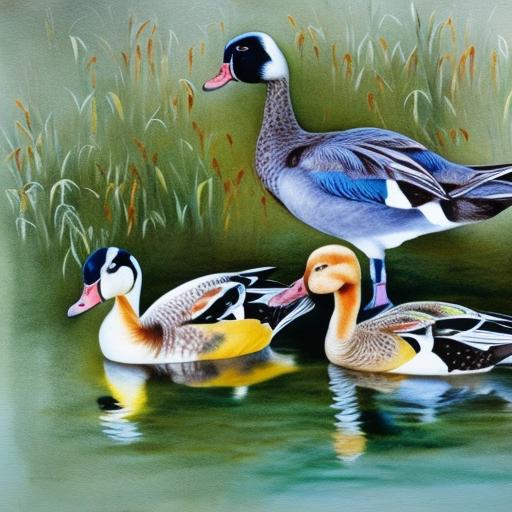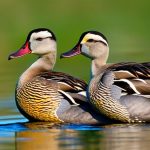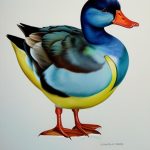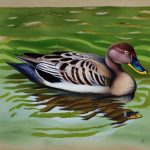Breeding male ducks play a crucial role in the reproduction and genetic diversity of duck populations. They are responsible for fertilizing the eggs laid by female ducks, ensuring the continuation of the species. Selecting the right breeding male duck is essential for maintaining and improving the quality of the duck population. Breeding male ducks also contribute to the overall health and well-being of the flock, as they play a key role in natural mating behavior and the successful hatching of offspring. Understanding the importance of breeding male ducks is essential for any duck breeder or farmer looking to maintain a healthy and sustainable duck population.
Breeding male ducks are essential for maintaining genetic diversity within a duck population. By selecting the right breeding males, duck breeders can ensure that desirable traits are passed on to future generations, such as disease resistance, egg production, and overall health. Additionally, breeding male ducks play a crucial role in natural mating behavior, which can lead to successful reproduction and hatching of offspring. Without healthy and genetically diverse breeding male ducks, duck populations may be at risk of inbreeding and genetic disorders, which can have detrimental effects on the overall health and productivity of the flock. Therefore, understanding the importance of breeding male ducks is essential for maintaining a sustainable and thriving duck population.
Key Takeaways
- Breeding male ducks play a crucial role in ensuring successful reproduction and genetic diversity within a flock.
- When selecting a breeding male duck, consider factors such as health, temperament, and genetic traits to ensure the best possible offspring.
- Preparing for breeding season involves creating a suitable environment, providing proper nutrition, and ensuring the ducks are in optimal health.
- Encouraging natural mating behavior in male ducks can be achieved by providing a stress-free environment and ensuring the presence of compatible female ducks.
- Ensuring the health and well-being of the breeding male duck involves regular health checks, proper nutrition, and providing a clean and safe living environment.
- Managing the breeding process includes monitoring mating behavior, providing nesting materials, and ensuring the ducks have access to a suitable nesting area.
- Caring for the offspring involves providing proper nutrition, warmth, and protection from predators, as well as monitoring their health and development.
Selecting the Right Breeding Male Duck
When selecting a breeding male duck, it is important to consider several factors to ensure the health and genetic diversity of the flock. Look for a breeding male duck that exhibits desirable traits such as good conformation, strong legs, and a healthy body weight. It is also important to consider the duck’s genetic background and lineage to avoid inbreeding and genetic disorders. Additionally, observe the duck’s behavior and temperament to ensure that it is compatible with potential mates and will exhibit natural mating behavior. Selecting the right breeding male duck is crucial for maintaining a healthy and genetically diverse duck population.
When selecting a breeding male duck, it is important to consider its physical attributes and overall health. Look for a duck that has good conformation, strong legs, and a healthy body weight, as these traits are indicative of good overall health and reproductive potential. Additionally, consider the duck’s genetic background and lineage to avoid inbreeding and genetic disorders within the flock. It is also important to observe the duck’s behavior and temperament to ensure that it will exhibit natural mating behavior and be compatible with potential mates. By carefully selecting the right breeding male duck, duck breeders can ensure the health and genetic diversity of their flock, leading to a sustainable and thriving population.
Preparing for Breeding Season
Preparing for breeding season is essential for ensuring the successful reproduction and hatching of offspring. Provide breeding male ducks with a balanced diet that includes essential nutrients such as protein, vitamins, and minerals to support their reproductive health. Create suitable nesting areas for female ducks to lay their eggs, and provide adequate space for natural mating behavior to occur. Additionally, monitor the overall health and condition of breeding male ducks to ensure they are in optimal breeding condition. Proper preparation for breeding season is crucial for the successful reproduction and hatching of healthy offspring.
As breeding season approaches, it is important to prepare breeding male ducks for optimal reproductive health. Provide them with a balanced diet that includes essential nutrients such as protein, vitamins, and minerals to support their overall health and reproductive function. Create suitable nesting areas for female ducks to lay their eggs, and provide adequate space for natural mating behavior to occur. Additionally, monitor the overall health and condition of breeding male ducks to ensure they are in optimal breeding condition. Proper preparation for breeding season is essential for ensuring the successful reproduction and hatching of healthy offspring.
Encouraging Natural Mating Behavior
Encouraging natural mating behavior in breeding male ducks is essential for successful reproduction and hatching of offspring. Provide breeding male ducks with access to suitable mates and create an environment that allows for natural mating behavior to occur. Monitor the behavior of breeding male ducks to ensure they are exhibiting normal mating behavior, and intervene if necessary to facilitate successful reproduction. Encouraging natural mating behavior in breeding male ducks is crucial for maintaining a healthy and genetically diverse duck population.
To encourage natural mating behavior in breeding male ducks, provide them with access to suitable mates and create an environment that allows for natural mating behavior to occur. Monitor the behavior of breeding male ducks to ensure they are exhibiting normal mating behavior, and intervene if necessary to facilitate successful reproduction. Encouraging natural mating behavior in breeding male ducks is essential for maintaining a healthy and genetically diverse duck population.
Ensuring the Health and Well-being of the Breeding Male Duck
Ensuring the health and well-being of breeding male ducks is crucial for their reproductive success and overall quality of life. Provide breeding male ducks with regular veterinary care to monitor their reproductive health and address any potential issues that may arise. Maintain a clean and hygienic environment for breeding male ducks to prevent the spread of disease and ensure their overall well-being. Additionally, provide breeding male ducks with a balanced diet that meets their nutritional needs to support their reproductive function. Ensuring the health and well-being of breeding male ducks is essential for maintaining a healthy and sustainable duck population.
To ensure the health and well-being of breeding male ducks, provide them with regular veterinary care to monitor their reproductive health and address any potential issues that may arise. Maintain a clean and hygienic environment for breeding male ducks to prevent the spread of disease and ensure their overall well-being. Additionally, provide breeding male ducks with a balanced diet that meets their nutritional needs to support their reproductive function. Ensuring the health and well-being of breeding male ducks is crucial for their reproductive success and overall quality of life.
Managing the Breeding Process
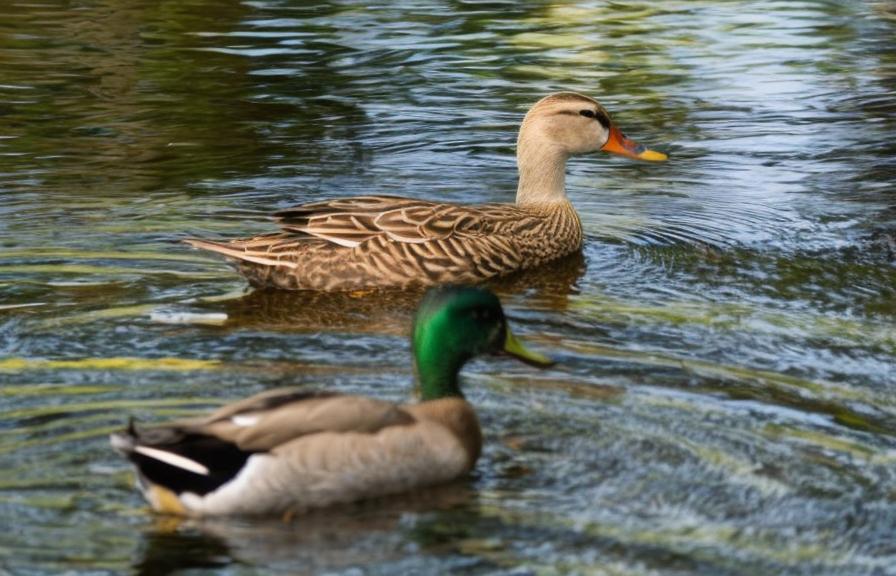
Managing the breeding process involves monitoring the reproductive health and behavior of breeding male ducks to ensure successful reproduction. Keep detailed records of mating behavior, egg production, and hatching success to track the progress of the breeding process. Intervene if necessary to facilitate successful reproduction, such as providing additional nesting areas or adjusting mating pairs as needed. Managing the breeding process is essential for maintaining a healthy and genetically diverse duck population.
Managing the breeding process involves monitoring the reproductive health and behavior of breeding male ducks to ensure successful reproduction. Keep detailed records of mating behavior, egg production, and hatching success to track the progress of the breeding process. Intervene if necessary to facilitate successful reproduction, such as providing additional nesting areas or adjusting mating pairs as needed. Managing the breeding process is essential for maintaining a healthy and genetically diverse duck population.
Caring for the Offspring
Caring for the offspring involves providing them with proper nutrition, shelter, and veterinary care to ensure their health and well-being. Monitor the growth and development of ducklings closely to identify any potential issues early on and address them promptly. Create a safe and secure environment for ducklings to thrive, including access to clean water, suitable bedding, and protection from predators. Caring for the offspring is crucial for ensuring the continued success and sustainability of the duck population.
Caring for the offspring involves providing them with proper nutrition, shelter, and veterinary care to ensure their health and well-being. Monitor the growth and development of ducklings closely to identify any potential issues early on and address them promptly. Create a safe and secure environment for ducklings to thrive, including access to clean water, suitable bedding, and protection from predators. Caring for the offspring is crucial for ensuring the continued success and sustainability of the duck population.
In conclusion, understanding the importance of breeding male ducks is essential for maintaining a healthy and sustainable duck population. Selecting the right breeding male duck involves considering physical attributes, genetic background, and temperament to ensure optimal reproductive success. Preparing for breeding season, encouraging natural mating behavior, ensuring the health and well-being of breeding male ducks, managing the breeding process, and caring for the offspring are all crucial steps in maintaining a thriving duck population. By following these guidelines, duck breeders can contribute to the overall health and genetic diversity of duck populations while ensuring successful reproduction and hatching of healthy offspring.
If you’re interested in breeding male ducks, you may also want to consider the importance of providing adequate space for your poultry. According to Poultry Wizard, the size of a coop is crucial for the well-being of chickens. To learn more about how big a coop needs to be for chickens, check out their informative article here. Understanding the housing requirements for your birds is essential for successful breeding and overall flock health.
FAQs
What is the purpose of breeding male ducks?
Breeding male ducks are used to mate with female ducks in order to produce offspring for various purposes such as meat production, egg production, or for ornamental purposes.
How do you select a breeding male duck?
When selecting a breeding male duck, it is important to consider its physical characteristics, health, and genetic background. Look for ducks that are healthy, have good body conformation, and come from a good genetic lineage.
What are the characteristics of a good breeding male duck?
A good breeding male duck should have a strong and healthy body, with well-developed muscles and good overall conformation. It should also have a strong libido and be able to successfully mate with female ducks.
How do you care for breeding male ducks?
Breeding male ducks should be provided with a balanced diet, clean water, and proper shelter. They should also be monitored for any signs of illness or injury, and given appropriate veterinary care when needed.
How do you encourage breeding behavior in male ducks?
To encourage breeding behavior in male ducks, it is important to provide them with a suitable environment and the presence of female ducks. Ensuring that they have access to clean water and a comfortable nesting area can also help stimulate breeding behavior.
Meet Walter, the feathered-friend fanatic of Florida! Nestled in the sunshine state, Walter struts through life with his feathered companions, clucking his way to happiness. With a coop that’s fancier than a five-star hotel, he’s the Don Juan of the chicken world. When he’s not teaching his hens to do the cha-cha, you’ll find him in a heated debate with his prized rooster, Sir Clucks-a-Lot. Walter’s poultry passion is no yolk; he’s the sunny-side-up guy you never knew you needed in your flock of friends!

